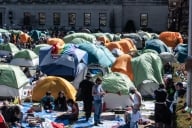You have /5 articles left.
Sign up for a free account or log in.
BOSTON -- It was an all-white panel, assembled to address racism.
“That in and of itself is white privilege,” said Lauren Cook, dean of college and gap-year advising at Jewish Community High School of the Bay, a private high school in San Francisco. At same time, however, “Racism and white supremacy, these are our own creation, and ultimately our own messes to clean up.”
The panel, held as part of the National Association for College Admission Counseling’s annual conference, was in some ways an extension of this year’s keynote speech.
“Racism isn't just tiki torch-carrying white nationalists,” Shaun R. Harper, a professor at the University of Southern California's school of education and executive director for the university's Race and Equity Center, said in his keynote speech the day before. “It's not just the things Donald Trump says. It's also the things that happen in high schools and in college admissions offices.”
The panelists at Friday’s session, which was dubbed “Counseling While White,” spoke out against structural racism and the risks that centering one’s worldview around whiteness -- which is often conflated with an attempt to be race neutral, as opposed to being steeped in race -- can pose for both high school and college students.
“If you’re blind to whiteness in your personal life,” said April Crabtree, assistant vice president of undergraduate admission at the University of San Francisco, citing the popularity of media and books and other aspects of everyday life that lack diversity, “you will not be aware of this in your professional lives.”
Although the panel was all white, the room drew a diverse array of attendees. The audience, however, might not have been representative of higher education as a whole, which is why Crabtree mentioned whiteness in audience members’ professional lives: nearly 80 percent of professors are white, and that percentage is even higher when it comes to university leaders and administrators.
And panelists said there were consequences to an overwhelmingly white work force, especially one that isn’t aware of its own biases.
“I don’t think most people understand the ways we contribute systematically, institutionally, toward racism,” said Heath Einstein, dean of admission at Texas Christian University.
Crabtree pointed to the ways in which even talking about diversity can be “whitewashed” when recruiting students to a given college.
“The question is, how does this directly impact the work that we do in admissions? I want you to think, for just a minute, how you have heard college admissions officers talk about diversity,” Crabtree said. “How do we represent our institutions to students of color, and how do we whitewash this?”
“Often this conversation about diversity ends up being … ‘Well, 14 percent of college students come from underrepresented groups. But we also have students from public schools and private schools, and from a record number of states.’ But the last time I checked, it wasn’t people from Washington or Maine or Oklahoma who were being shot and killed disproportionately by police.”
The issue raises the question of whom college admissions officials and high school guidance counselors truly serve, panelists said.
Einstein said that he has experienced pushback and criticism while trying to push for a more progressive admissions office at TCU -- both from alumni who resisted his changes and people of color who felt he went about it in an offensive way. He said he’s taken it in stride, trying to take criticism constructively without sacrificing his mission.
But he also said that change can’t just be limited to ideas, panels or feedback.
“If I’m a student of color, and I’m looking at [a given] school, I’m not seeing people who look like me,” he said, referring to a trend that multiple panelists had seen of college tour guide staff generally being overwhelmingly white. “It’s important that the processes that you put in place align with the goals you espouse.”
“Is your staff reflective of the people you’d like to see on campus?” Einstein asked, referring not just to tour guides but to all employees. “If it isn’t, you’re probably looking at the world through a white lens … and if you’re just hiring through the same websites, or going through the same organizations you always did, it would be foolish to expect different results.”
The panel was short on specific solutions to specific problems in high school counseling or college admissions, although it was organized in an effort to get people -- white people, in particular -- talking about, or in some cases even acknowledging, the ways race and racism infiltrate their profession. In lieu of specific solutions, above all the panelists asked their fellow attendees to listen constructively to people of color.
“We made this mess, white folks,” Einstein said. “We may not be responsible for it beginning, but we’re sure as hell responsible if it doesn’t end.”








